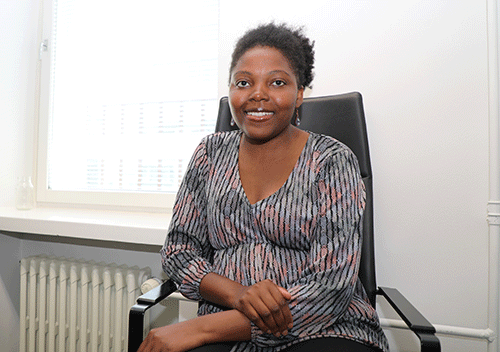Tuwilica Kahuika
Inge Kalumbu-Lapp is a Namibian who has been living in Finland for the past seven years after first coming to the country through a bilateral exchange programme between the University of Namibia and the University of Helsinki in 2014. She graduated from Unam with a BA: Social Work, and is a participant graduate of the Youth Leadership Development Programme (YLDP) in Namibia. Her active involvement in youth politics and leadership spans since high school, throughout tertiary level till date.
Kalumbu-Lapp believes that “in politics, we should lead with diplomacy”, and is a keen human rights activist with strong values for peace on earth. Born on Africa Day on 25 May, she believes she was born as a “peace child”, and explains her enthusiasm for peace as being that it is every nation’s right to enjoy peace and safety as no individual or nation has the right to take that freedom away from anybody.
Currently, she works for the Namibian Embassy in Helsinki, and was one of the four-member panel representing youth at the Nordic-African Foreign Ministers’ Meeting (NAFM 2022) Youth Panel in Finland. She expresses herself independently for life on earth. Thus, the views and opinions are her own, and do not represent government or her workplace.
Q: Do you think there was a true representation of both Nordic and Africa on the NAFM 2022 Youth Panel?
A: During the panel discussion, we young people did not see ourselves as the Nordic or African youth. We saw ourselves as young people. We are one people, and seeing ourselves differently would be discriminatory, based on one’s background.
Q: But in terms of challenges, Africa and Nordic youth have different challenges, so there is an automatic separation in challenges, not necessarily discriminatory.
A: Yes, you are correct to say that the challenges are different in the sense that challenges change in terms of where you are. For instance, when I was living in Namibia, my top priority was education.
I studied social work, and my goal was to become well-educated enough to help my people and bring them out of poverty, or counsel them with mental wellbeing or give them hope. But as soon as I came to Finland, things changed.
Q: How did things change, was it because you were educated now?
A: When you are away from your own country as any foreigner or African, you are seen as just an ordinary foreigner; you can’t find employment. In Finland, if you don’t speak Finnish, you can’t find employment. You find highly-educated people with PhDs who face the same problem, and the issue is most of them are forced to think, should I stay in a country where I am not welcome, or should I go home? You want to change locations to find better livelihoods, so why should humans be forced to stay in a place where they are not growing or they can’t find opportunities?
Q: As a fellow panellist, would you say that multi/bilateral agreements work 50/50 in terms of give and take?
A: The scale is imbalanced: Nordic on top, Africa lower. For a long time, that scale has not changed; the scale is supposed to be level. It’s the same inequalities that you see at home between the local or indigenous people in comparison to those with a European background. Diplomacy sometimes is just to keep the peace.
Q: As someone living in Finland, what is your take on ‘migration for greener pastures’ to Finland?
A: If a person leaves their home country to seek greener pastures, they should be able to be given the same rights.
If you are not helping Africa correctly, that means more and more people will flee Africa, thinking there are opportunities in Europe. When I walk around here, I am seen as a poor African who has nothing.
Locals think you are here eating up their tax, and they hate that. If they would have invested in Africa, built more schools, built more hospitals, factories that would manufacture and put Africa on the same map [sic] as Europe, the US or China, it would be something else.


